 The average punter who places the occasional online bet every week or so might not trouble themselves too much with hunting down the very best odds, or the bookie offering best value.
The average punter who places the occasional online bet every week or so might not trouble themselves too much with hunting down the very best odds, or the bookie offering best value.
They probably don’t think about whether a bookie is independent, runs on third party software, or are a white label – and it’s even less likely they will bet using an exchange.
For many of us though, the hunt for value compels us to learn more about the industry and about the bookies themselves, including how they operate behind the scenes.
This gives us a good overall picture of how hands on the operators are and also makes it possible for us to categorise bookies based on their setup.
Over time, a common line of thinking has developed which assumes that independent bookies offer better prices than white labels or those using third party software in the main.
But is this true?
We have conducted a bit of research to find out.
Testing the Odds

We picked 10 different bookies, and looked at a small subset of odds (and margins) offered by all of them across a selection of different markets.
Importantly, the bookies we picked belong to the different categories we talked about in the introduction.
These are:
- Independents: Bookmakers who do everything for themselves, from building and running their websites to drawing up their own odds using in house traders.
- Gambling Groups: Similar to the above, but brands that are part of wider gambling groups like Entain or Flutter, for example.
- 3rd Party Software: Brands using platforms provided externally, by companies like SBTech and FSB, but operating on their own license. The 3rd party platform provider compiles the odds, but the brand can adjust the margin.
- White Labels: These brands leave everything but their marketing to the platform provider. They even operate on the provider’s license. White labels are mostly, but not always, new smaller brands, and do not mess with the odds in any way.
- Betting Exchanges: Instead of betting against the bookie punters bet against each other, with the exchange matching opposing bettors then taking a commission from the winners. Punters can back or lay using an exchange, so the odds are dictated by how much money is being matched by the platform on each market and at what price.
The bookies we decided to go with in each category for our research were:
| Category | Bookmaker |
|---|---|
| Independent | bet365 |
| Independent | Betfred |
| Gambling Group | Coral |
| Gambling Group | William Hill |
| 3rd Party | 10bet |
| 3rd Party | Vbet |
| White Label | Jenningsbet |
| White Label | Blacktype |
| Exchange | Betfair |
| Exchange | Betdaq |
Just as importantly, we took the odds on each market from all bookies on the list at the very same time, so we can look at the results from this admittedly small sample and compare them fairly.
We selected a range of pre-match and in-play markets across a number of different sports, including; football, tennis, horse racing, golf, cricket and snooker. The aim was to pick odds that were both popular and heavily bet on, such as Champions League football matches, as well as lines that are less competitive, such as snooker in-play. This allowed us to sample all types of markets to prevent a bias towards particularly competitive or obscure markets.
That said, while we will be comparing margins based on our results, this is just a snapshot of what is available from all the bookies selected and doesn’t represent their odds across the board. The point here isn’t to find out which specific bookie is the ‘best’, but to get a general idea of how odds compare from one category of bookie to the next. We have chosen to use the ten bookmakers on the list above, but could just as easily have chosen different ones to do the same experiment.
Now we know what we are looking at and why, lets quickly swot up on how bookies generate their odds in the first place before diving into the results.
How Bookmakers Set Their Odds
It’s worth briefly touching on exactly how odds are generated between the different categories of bookmaker.
True independents and those from gambling groups can be put into the same category for this, as can full white labels and those only using 3rd party software, so along with exchanges that gives us 3 categories to cover.
Independents
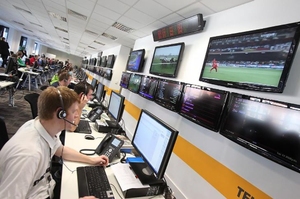 Using a combination of in house human odds traders and extremely sophisticated software, independents and those working as part of bigger gambling groups can set their own odds and stay truly autonomous.
Using a combination of in house human odds traders and extremely sophisticated software, independents and those working as part of bigger gambling groups can set their own odds and stay truly autonomous.
Their prices will be based on their own work and predictions and this also gives them the freedom to come up with new markets quickly and easily, something which those using 3rd party platforms cannot really do. This is why independents can offer request a bet services, and they are also often first to offer prices on many markets, sometimes way ahead of time.
They may sometimes use 3rd party odds feeds for specific things if they have no real knowledge or expertise in the area (esports is a good example), but aside from these occasional bolt ons everything is done in house.
White Labels/3rd Party
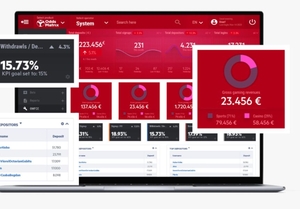 For brands using 3rd party platforms, the odds are compiled by the platform they are using, not by the brand themselves. This means that every brand using the platform in question will be using the same odds.
For brands using 3rd party platforms, the odds are compiled by the platform they are using, not by the brand themselves. This means that every brand using the platform in question will be using the same odds.
However, this doesn’t mean all those brands will have the same prices on their websites, because they can adjust their margins on each sport to be more or less competitive. So while the starting odds are the same, what ends up on the site might not be.
What they can’t do though is offer markets that the platform provider doesn’t offer, so many brands in this situation (white labels in particular) can end up looking very similar both in terms of their website’s design and its’ content.
It is easier and cheaper than employing odds traders though, and some of that saving could be passed on to the customer in the form of more generous margins.
Exchanges
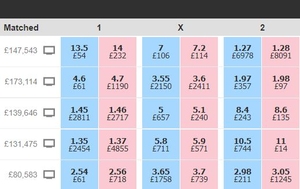 Betting exchanges are completely different in their approach, because it is in fact the customer that creates the odds, not the exchange.
Betting exchanges are completely different in their approach, because it is in fact the customer that creates the odds, not the exchange.
One bettor offers a price on an outcome and needs another to take their bet before it becomes active. This then creates the odds organically. With busy markets you get odds changing all the time as people back and lay, and you can even get your bet matched offering worse odds than the current ‘going rate’ when demand is high. Conversely, on less liquid markets you might see “Make an Offer” instead of a price where there is currently no money to be matched. The bettor is being asked to name a price and get the market started.
With popular fixtures and bets this actually creates a truer reflection of the market because it is a numerical representation of what real punters think is going to happen, but the downside is that less popular sports probably won’t have prices at all.
The exchange itself doesn’t create odds and therefore has no margin, so instead they charge a commission on winning bets for providing the service. So one punter winning £10 from another will only receive £9.50 based on a 5% commission rate, while the losing punter simply loses their stake as normal.
Do Independent Bookmakers Offer Better Odds?
The main thing to come out of this experiment was slightly surprising, because whichever way we looked at the results there wasn’t really much in it one way or another.
The chart below shows the average odds for each bookmaker category (we have combined the independents/groups and 3rd party/white labels here), and as you can see there is very little difference.
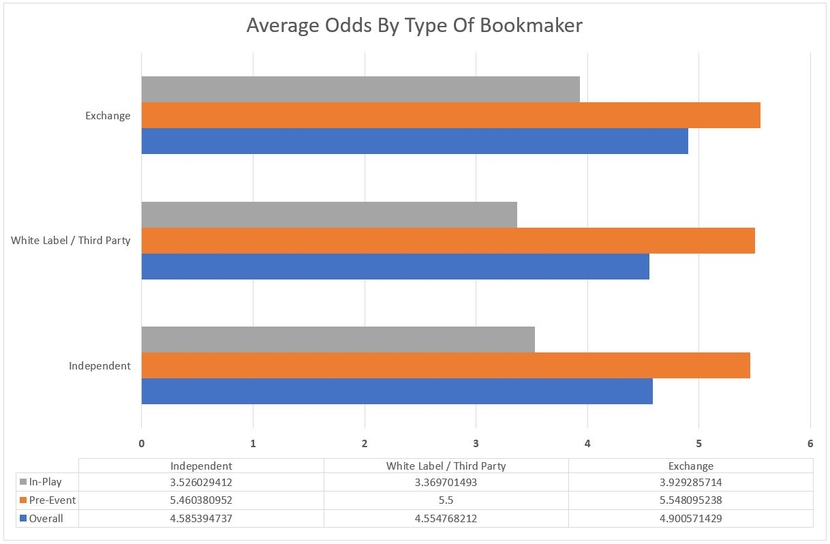
The actual average odds values are in themselves meaningless as they are an average of the specific markets for which we have collected data. The point is that we tested the same markets for all sites at the same time, it is the difference between the different sites and types of sites that matter.
If we drill down a little deeper we can see the overall average odds for each separate bookie; so this takes all odds collected both in-play and pre-event, and combines them to get the following results:
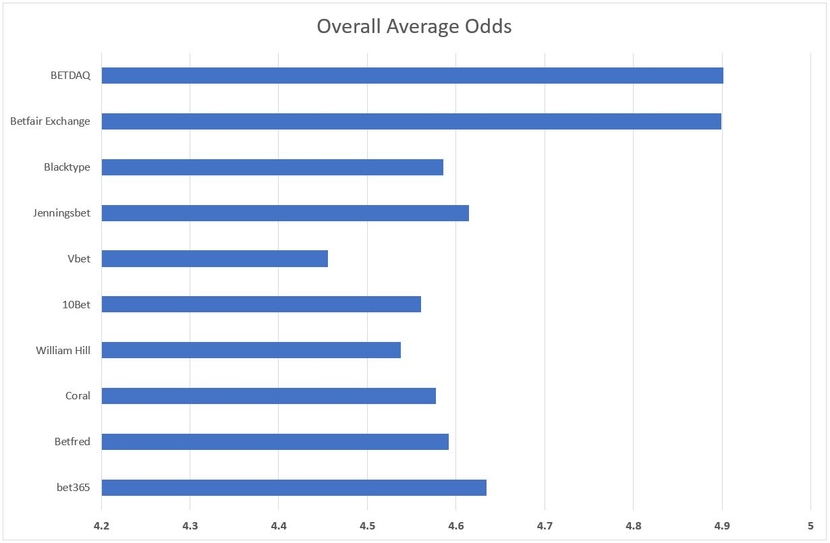
There is more of a range from one bookmaker to another here but the interesting thing is that it is the two true independents and the two full white label bookies that offer the strongest odds.
In fact, Jenningsbet comes in a very close second to bet365, which completely rubbishes the idea that independent bookies offer better odds than white labels.
If we look only at pre-event odds the results are even more surprising.
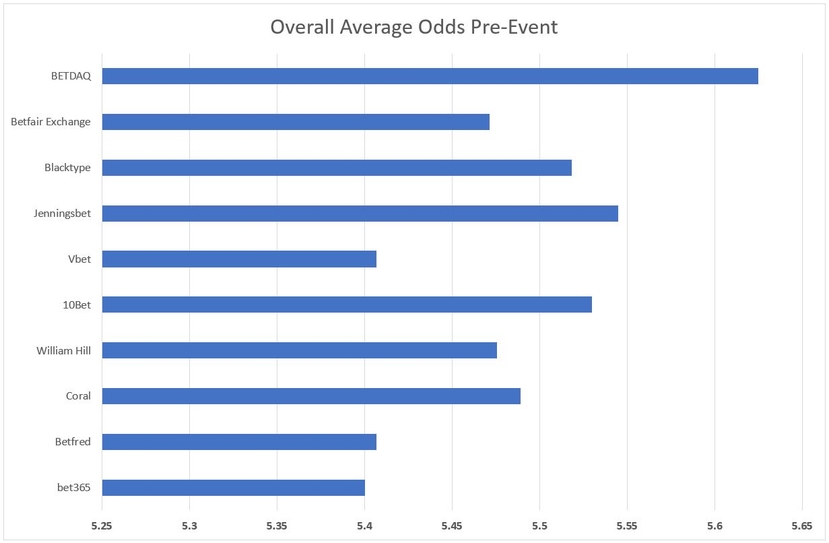
Considering the pre-event odds only, 3 of the 4 white labels/3rd party platform bookmakers offered stronger odds than all four independents, with the true independents (bet365 and Betfred) being significantly lower. Of the white labels/3rd party bookies, only Vbet came in lower.
They even offered better value than the odds available on Betfair’s exchange which is pretty remarkable, since exchanges are well known for offering better prices than fixed odds bookies on the whole.
However, things flip when looking at in-play odds, where exchanges tend to be much busier and independents gain ground.
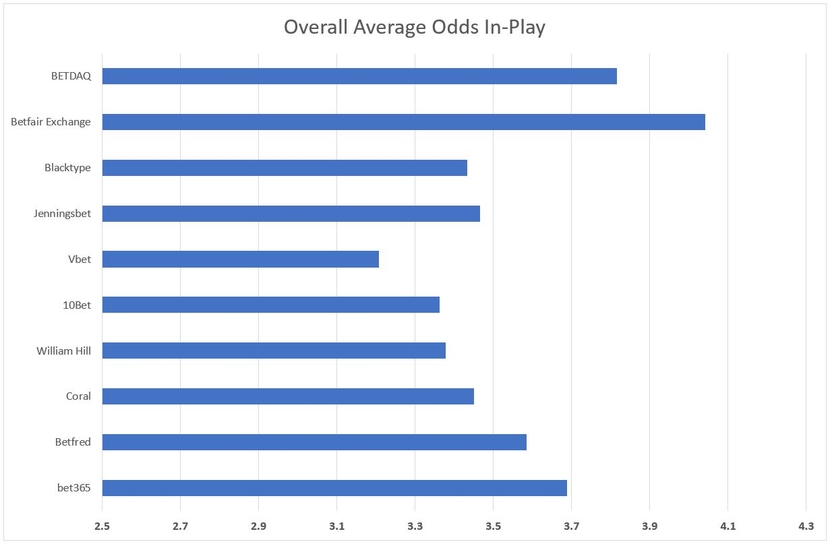
Both betting exchanges are the clear leaders here, but although the true independent bookmakers offer the strongest fixed odds those in gambling groups (Coral and William Hill) are either on par or only marginally better than the 3rd party and white label brands.
And once again, Jenningsbet and Blacktype perform well, with the former even edging slightly ahead.
Comparing Margins
From some of the markets we looked at, we were able to work out the margin set by each bookie for that specific bet.
This was only possible with certain bet types such as WDW, BTTS, player to win, etc. so the results do not include all of the data we collected.
Still, there is enough to get a general idea of how each bookie in each category handles their margins overall.
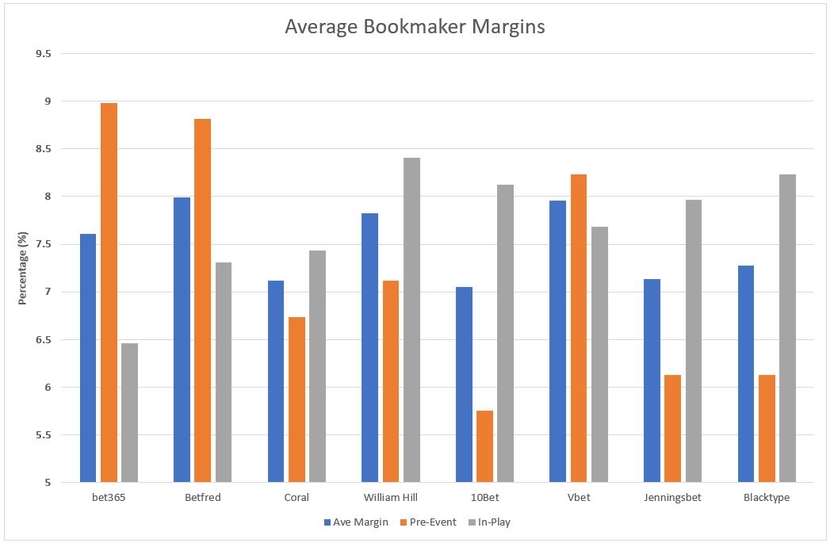
We haven’t included exchanges in the data above as exchanges do not have traditional bookmaker margins, rather they charge a set commission on all winning bets. That commission is variable based on the type of account you have with the exchange too.
As could be expected after looking at the odds data in the section above, margins are pretty generous pre-event from the likes of Blacktype, Jenningsbet, and especially 10bet.
Independent bookies tend to reduce margins for in-play markets, probably as the picture becomes clearer for the market in question, and bet365 in particular do a complete 360 dropping from almost 9% pre-event to just under 6.5% in-play. That is almost a whole percentage point lower than their closest rival, Betfred, the other true independent.
10bet raise their margin almost as much in the other direction, but the change isn’t quite as dramatic.
The average margin across all bookmakers is a little more balanced and those taking the smallest cut are a nice spread of independents, white labels, and bookies using 3rd party software.
You will notice the exchanges were not included in this data.
That is because exchanges have a fixed margin which they take from the winning bettor’s profits, so we would learn nothing useful by including the margins of Betdaq or Betfair here.
What Have we Learned?
 It’s been enlightening to realise that, overall, there is no clear winner in terms of the ‘best’ category of bookmaker.
It’s been enlightening to realise that, overall, there is no clear winner in terms of the ‘best’ category of bookmaker.
As we expected, exchanges can generally beat fixed odds bookies by a little, but the problem is that less liquid markets might be difficult to find a match for. It’s no use offering a bet at great odds if no one will take that bet.
The debate over whether white labels offer worse odds than independents has been well and truly settled though, for this dataset at least. As we said, it’s a small sample size and not 100% conclusive, but it doesn’t show a clear advantage to using one type of bookie over another.
What we can maybe glean from this is the different bookies’ approach to their odds levels and how they set their margins.
10bet are interesting because they were the most generous pre-event by quite some margin (no pun intended), but they had one of the highest percentages for in-play bets. Perhaps their strategy is to attract customers early doors with better odds in the hope they will go on to place more bets in-play where more profits can be made?
Coral, on the other hand, have much less volatility in their margins, so perhaps their approach is to offer consistency across the board for punters who don’t want to do too much groundwork or use more than one bookie.
This is all conjecture of course, but it makes for interesting reading. If you look back over the data you may be able to come up with your own conclusions as to the way each bookie approaches their odds levels and margins.
